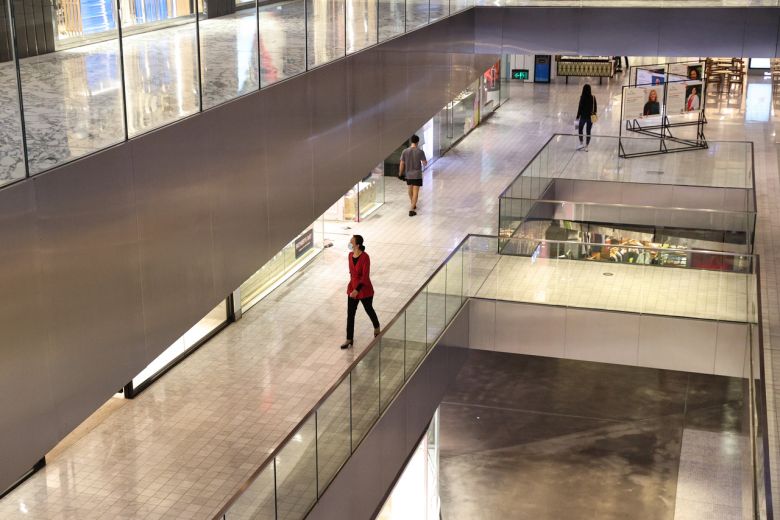Mall landlords, tenants face off in Australia as foot traffic plunges amid COVID-19 pandemic
SYDNEY — Australia’s first American-style shopping mall opened in 1957 – a sprawling, 26-store centre in Brisbane that attracted 15,000 people on its opening day.
The phenomenon quickly spread across the country, and there are now about 1,630 shopping centers in Australia with some 65,000 stores. In 2018, according to the Shopping Centre Council of Australia, A$141 billion (S$140 billion) worth of sales were made through shopping centers, equivalent to more than 7 per cent of the country’s gross domestic product.
But the Covid-19 pandemic is raising questions about the future of the malls and whether their existing operating model can survive.
The problem is that many retailers in Australia are struggling to pay their agreed rents as foot traffic plunges.
Major shopping malls gave stores rent relief but have demanded normal payments as restrictions eased. This has led to a series of tense stand-offs that prompted some malls to close stores that refused to pay rents. In other cases, some major retail chains threatened to shut their stores unless they received significant rent reductions.
The chief executive of fashion retail chain Mosaic Brands, Mr Scott Evans, last month threatened to close up to 500 stores at shopping malls. He said retailers were facing a “new reality” in which customers are permanently shifting from buying at brick-and-mortar stores to buying online.
“The retail rental market in Australia is not paused because of the pandemic – it is fundamentally changed for the future,” he said. “Shuttered stores work for no one, so we aim to minimize closures, but not on uncommercial terms.”
One of the highest-profile clashes between mall retailers and landlords involved Premier Investments, which owns a series of fashion chains. The company reportedly refused to pay rent when its stores were closed during the initial lockdowns imposed across Australia in March. It has since insisted that its rents should be based on its sales turnover.
But landlords say such a move would threaten the viability of shopping centers, which have large up-front costs and should not be responsible for attracting customers to individual stores.
Scentre Group, which operates Westfield malls and is Australia’s biggest shopping centre landlord, recently locked out 129 stores belonging to Mosaic and 38 belonging to Strandbags, a handbag and luggage chain. The move was seen as an attempt to warn other chains that it would not agree to ongoing rent relief. In late August, the chains’ stores reportedly reopened after they reached confidential agreements with Scentre.
Scentre’s chief executive Peter Allen has insisted that rents must be fixed rather than linked to sales.
“I don’t know where the mindset comes from that a level of sales is a function of rent,” Mr Allen told The Sydney Morning Herald. “Retailers pay rent out of profit, they don’t pay rent out of sales.”
Scentre last month reported a loss of A$3.6 billion in the first half of the year. It collected just 48 per cent of rents from April to June amid lockdowns and as customers remained wary of returning to malls.
Gradually, shopping malls have largely returned to normal as the pandemic has come under control. Aside from the state of Victoria, which has imposed tight lockdowns to address a surge in Covid-19 cases, the rest of the country is mostly operating as normal.
Australia reported 76 new Covid-19 cases last Saturday, including 63 in Victoria and 10 in New South Wales.
The major malls have reported that more than 90 per cent of stores – excluding those in Victoria – are now open. But foot traffic is still down, as people remain concerned about entering large indoor spaces.
Furthermore, the economy is in the doldrums with officials reporting last Wednesday that the country had fallen into a recession – defined as two consecutive quarters of negative growth – for the first time since 1991.
An expert on retail history, Dr Matthew Bailey from Macquarie University, said shopping mall landlords and tenants have long been locked in a contest over benefits and costs. But the pandemic is heightening tensions and forcing landlords to ask whether retailers are moving towards a “permanently smaller physical footprint and greater investment in online shopfronts”, he said.
“When there is any sort of return to normal, both sides will enter fresh leasing negotiations with an acrid taste from what is rapidly becoming their most vitriolic fight to date,” he wrote on The Conversation website.
For more news about the novel coronavirus click here.
What you need to know about Coronavirus.
For more information on COVID-19, call the DOH Hotline: (02) 86517800 local 1149/1150.
The Inquirer Foundation supports our healthcare frontliners and is still accepting cash donations to be deposited at Banco de Oro (BDO) current account #007960018860 or donate through PayMaya using this link.
